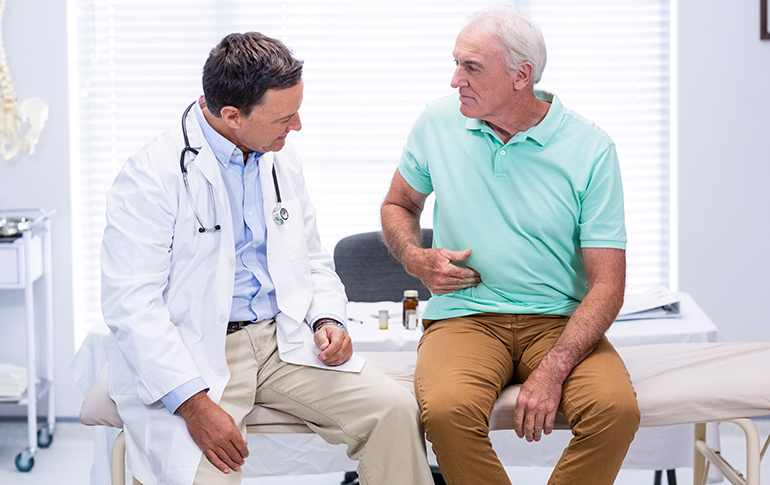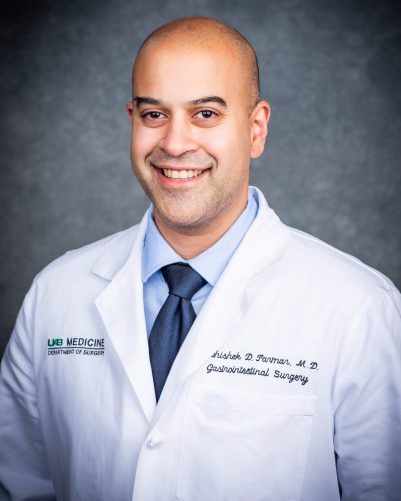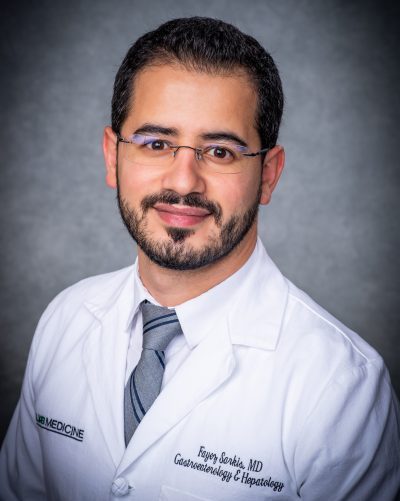We offer a full range of evaluation and testing services in a single location, including a state-of-the-art endoscopy center on site. The Digestive Health Center offers the most advanced minimally invasive surgical techniques, which allow for much faster healing and fewer potential complications than with traditional open surgery. Our experts work closely with a variety of other subspecialties, including nutrition and pain management, to provide a comprehensive care plan for your condition and optimize the patient experience. Patients who meet certain criteria can meet with both the medical and surgical teams in a single visit.
Conditions Treated
- Upper GI disease, including Barrett’s esophagus
- Pancreatic and biliary disease, including cancer
- Acute and chronic pancreatitis
- Colorectal disease, including cancer
- Obesity
- Gallstones
- Thyroid, parathyroid, and adrenal disease
- Hiatal and paraesophageal hernias
- Gastroesophageal reflux disease (GERD) and acid reflux
- Inflammatory bowel disease
- Irritable bowel syndrome (IBS)
- Small bowel disorders
- Celiac disease (also known as celiac sprue or gluten-sensitive enteropathy)
Procedures & Services
- Evaluation for liver transplantation
- Double-balloon enteroscopy
- Radiofrequency (RF) ablation
- Endoscopic submucosal resection
- Diagnostic and therapeutic ERCP (endoscopic retrograde cholangiopancreatography)
- Bariatric surgery for obesity, using minimally invasive and robotic techniques
- Robotic colon and rectal surgery
- Advanced GI laparoscopy
- Anti-reflux procedures
About UAB Medicine Digestive Health
Created in 2013, the UAB Digestive Health Center helps patients better manage digestive conditions and improve their lifestyles. The center combines our expertise in gastrointestinal (GI) care, GI surgery, colorectal surgery, and transplant surgery with hepatology, which focuses on treating conditions of the liver, gallbladder, pancreas, and the vessels (known as the biliary tree) that connect those organs. It is staffed by a multispecialty team of physicians, nurses, and other medical professionals who are highly skilled in managing patients with GI disease.
Care Providers
Resources
Related Specialties
- Anal Cancer
Bariatric Surgery
Bile Duct Cancer
Celiac Disease
Colon Cancer
Colonoscopy
Common Gastroenterology Conditions
Diagnostic Laparoscopy
Gallstone
Gastroenteritis
GERD (gastroesophageal reflux disease)
Inflammatory Bowel Disease
Irritable Bowel Disease
Obesity
Pancreatic Cancer
Pancreatitis
Radiofrequency Ablation
Rectal Cancer
Stomach Cancer
Ulcerative Colitis
Clinical Trials
Speak to your physician about your options and browse the link below for more information
Latest News
View All News-
UAB researchers uncover shared response to dominant commensal bacterial flagellin epitope in Crohn’s patients and healthy infants
January 30, 2025
-
UAB receives renewed funding for colorectal cancer screening project
November 18, 2024
-
UAB celebrates milestone with 3,000 adult liver transplants
September 26, 2024
-
UAB Hospital continues to be the best hospital in Alabama, Birmingham metro, according to U.S. News & World Report
July 16, 2024
-
UAB to offer free colonoscopy screenings to under- and uninsured for second consecutive year
May 21, 2024






























